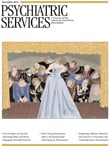The book The Great Perhaps is Chicagoan Joe Meno's poignant yet funny story about the Caspers, a family in crisis after being plagued with "cowardice" for generations. This novel should entertain and engage almost any audience, with its humorous and honest depiction of the modern American family in all of its complexity and dysfunction. This book will appeal to the mental health professional, in particular, because it speaks to some of our most challenging problems, such as reductionism, stigma, health system failures, intergenerational transmission of psychological trauma, and our wish to understand and prevent manmade causes of suffering.
In addition to telling the engaging story of the modern Casper family, Meno provides the reader with artful depictions of family members' suffering from various anxiety disorders and other identifiable mental illnesses in a wide variety of historical contexts. Each successive illustration of the Casper clan seems more tragically comical and reminds us that anxiety disorders and other mental illnesses are not new phenomena, that they don't tend to go away without intervention, and that they, indeed, may confer an evolutionary selective advantage that allows certain seemingly disabling traits to perpetuate themselves across generations, even if they can sometimes thwart our human desire to live lives of integrity and meaning.
The mental health professional will notice that mental illness goes unnamed, undiagnosed, and untreated for generations of Caspers, including the contemporary generations that dominate the novel. Although psychiatric diagnoses are never mentioned, the Caspers and their medical professionals accept more reductionistic, and seemingly less accurate and useful, general medical diagnoses. The absence of mental health care for this family (and the inadequacy of other health care professionals) is an indictment of our society and health care system, especially given that this family with almost every imaginable social advantage is still unable to get appropriate help.
The dust jacket asserts that this novel is about the need for complicated answers to complex questions. Whether this was actually Meno's intent is unclear. In fact, at times this story seems to argue that, while the questions that people face are often complicated, sometimes the best answers are pretty simple to understand, although the solutions are perhaps much more difficult to execute. In the case of the Caspers, the answer indeed seems to be fairly simple: be kind and truthful to yourself and others, be committed to reality, and get appropriate professional help!
As the Caspers come together at the end of the novel, I found myself rooting for them but not really knowing whether this family would make it. The Great Perhaps calls on us as mental health professionals to help the Casper families of this world, for the sake of those suffering today and for future generations.

